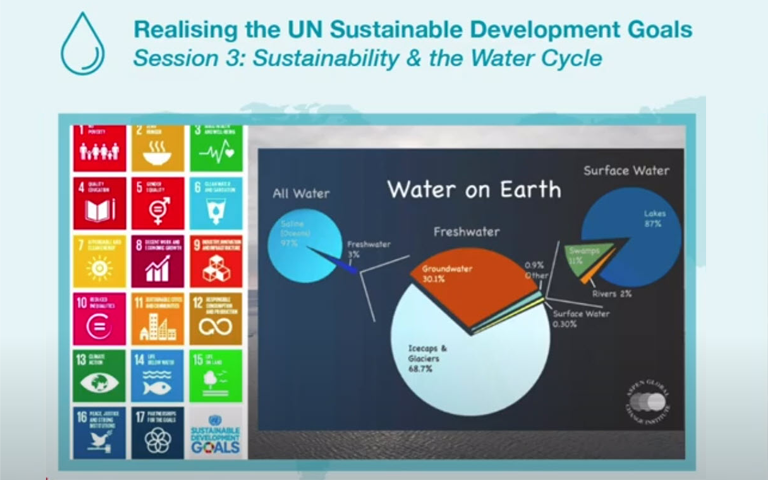Events: Sustainability & the Water cycle.
5 December 2020
Water is essential to life and the economy. It is a feature of several of the UN Sustainable Development Goals. It was a focus for a session organised by Dan Osborn at the recent Beyond Boundaries online conference.

As a part of a two-week virtual conference “Beyond Boundaries: Realising the UN Sustainable Development Goals” aiming to understand universities’ approaches to the Sustainable Development Goals (SDGs) and how universities can move forward to develop cross-disciplinary and beyond-boundary research and activities with our partners to address them. Session 3: “Sustainability & the Water Cycle” was organized by Dan Osborn. The session was introduced and chaired by Luiza Campos from UCL Engineering.
This session looked at how the water elements of SDGs 13 (Climate Action), 14 (Life Below Water), and 15 (Life on Land) are being delivered and are interacting with SDG6 that addresses water for human consumption and sanitation. It also examined whether the SDG targets linked to water are sufficiently comprehensive. Discussions explore key trade-offs and nexi between the water needs of people, food production, the economy, and the environment, and ask how we can develop a future knowledge and innovation agenda that could help speed up the delivery of relevant SDGs. It covered freshwater, oceans and the cryosphere.
There were speakers from Japan the Netherlands and the UK including Michel Tsamados was a speaker, on the use of satellites and the global hydrological cycle including the cryosphere. Dan Osborn and Michel Tsamados's PhD student Ferhat Yilmaz contributed a poster on changes in water use during the Covid-19 pandemic in Turkey. Ferhat's project concerns how drought risks in Turkey are altering as climate change moves forward and understanding how water resources can be affected by a range of factors is an important element of managing water resources sustainably in the future.
A few of the points that arose during presentations and the question-and-answer session were: (i) in water accounting procedures, remove water needed for the environment before allocating water to human, business and agricultural uses etc. (because otherwise this need will be marginalised with negative consequences down the line for the economy and society); (ii) build on international collaborations at the institutional, policy and research levels but ensure to keep a skeptical eye on how we measure progress towards the SDGs; (iii) make sure local communities are engaged in decisions on water resources and water use; (iv) recognise the importance of the cryosphere in global water resource management and make full use of current and upcoming satellite technologies to gain new insights into change.
Links:
- Prof Dan Osborn's academic profile
- Dr Michel Tsamados' academic profile
- Ferhat Yilmaz's research profile
- Sustainable Development Goals (SDGs)
 Close
Close

